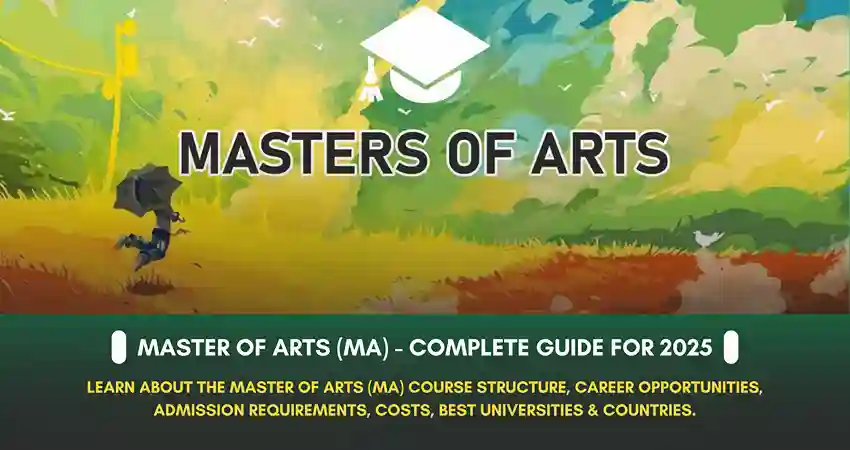The Master of Arts (MA) is one of the most popular postgraduate degrees worldwide, particularly in the humanities, social sciences, and creative fields. For international students, the MA is a flexible, globally recognized degree that can be completed in one year in the UK or two years in other countries.
This guide provides information on course structure, career prospects, costs, top universities, and the best countries to pursue an MA, offering updated insights for students in Asia, Africa, Europe, and the Americas as of 2026.
Table of Contents
ToggleWhat is a Master of Arts (MA)?
A Master of Arts is a postgraduate qualification awarded for advanced study in the humanities, social sciences, and related disciplines.
- Duration: 1 year (UK taught) or 2 years (many other countries)
- Focus: Critical thinking, theory, research, and communication skills
- Popular Subjects: Literature, History, Political Science, Sociology, International Relations, Media, Languages, Cultural Studies, Education, and Fine Arts
- Outcome: Higher employability, research opportunities, and pathways to PhD study
Master of Arts (MA) Course Structure & Learning Style
- Taught Modules: Theoretical and conceptual foundations in your subject area
- Optional Modules: Specialized topics (e.g., Human Rights Law, Digital Media Strategy, Gender Studies)
- Assessment: Essays, projects, exams, and practical work (in some creative fields)
- Final Dissertation/Thesis: 10,000–20,000 words based on original research
- Teaching Style: Seminars, workshops, supervised research, and independent study
Who Should Study a Master of Arts (MA)?
The MA is ideal for:
- Graduates seeking advanced subject knowledge
- Aspiring researchers planning to pursue a Ph.D.
- Professionals in education, policy, NGOs, the media, or the arts looking to develop their skills
- International students seeking a one-year master’s degree recognized globally.
Career Paths After a Master of Arts (MA) Degree
Common roles:
- Policy Analyst, Researcher, and Communications Specialist
- University lecturer or teacher
- NGO Project Manager or International Development Officer
- Journalist, editor, cultural program coordinator
High-Demand Sectors for MA Graduates:
- Education and academia
- International NGOs
- Government and Policy Institutes
- Media and Creative Industries
Admission Requirements for a Master of Arts (MA) Degree
- A Bachelor’s degree in a relevant field is required. A 2:1 or equivalent is preferred.
- Academic transcripts and a degree certificate.
- Personal statement (SOP):
- Letters of recommendation (1–3).
- Proof of English proficiency (IELTS, TOEFL, Duolingo, or MOI acceptance, depending on the university).
- Portfolio (for creative arts courses)
Cost of a Master of Arts (MA) Degree
- For international students in the UK: £9,000–£24,000 per year.
- Scholarships: University-specific awards, Chevening, Commonwealth, and other funding options
- Living costs in the UK range from £10,000 to £15,000 per year, depending on the city.
Always check official university websites for updated tuition rates and requirements, as they change annually. You can also contact STS Global Education for free guidance throughout your study abroad journey.
Best UK Universities for the Master of Arts (MA) Degree
Here is an updated list from Times Higher Education and QS of the top UK universities with strong MA programs in the humanities and social sciences.
- University of Oxford
- University of Cambridge
- London School of Economics (LSE)
- University College London (UCL)
- University of Edinburgh
- King’s College London
- University of Warwick
- University of St Andrews
- University of Manchester
- SOAS University of London
UK universities frequently update their entry requirements. Check their official websites or consult STS Global Education for the latest information.
How to Choose the Right Master of Arts (MA) Program
- Identify your career goal (academia, policy, creative, NGO).
- Compare course modules & research opportunities.
- Check university rankings in your subject area.
- Evaluate location, living costs, and work visa options.
- Look for scholarships and funding support.
Master of Arts (MA) vs. Master of Science (MS)
Although they are both master’s degrees, an MA and an MS differ in subject focus and learning approach.
FAQs
What is an Master of Arts (MA) degree?
An MA (Master of Arts) degree is a type of master’s degree that allows you to expand your knowledge of a subject in the humanities, social sciences, or arts.
What are the MA degree subjects?
In the Master of Arts program, you can choose to study:
- Anthropology
- Applied Linguistics
- Communication
- Economics
- History
- International Relations
- Legal Studies
- Literature
- Philosophy
- Political Science
- Psychology
- Sociology
- Studio Art
- Theology
- Theater
What are the entry requirements for an MA degree?
Typical admission requirements include a bachelor’s degree, a strong academic record, and relevant experience in your chosen field. Some programs may require additional materials, such as a statement of purpose, letters of recommendation, or a writing sample.
What can I do with an MA degree?
The careers you can pursue depend on what you study. For instance, studying English could lead to a career as a copywriter, content writer, editor, or social media manager, among other roles. This is because subjects in the humanities and social sciences emphasize valuable workplace skills such as critical thinking, creativity, and curiosity. According to the World Economic Forum, these are among the most desired skills in the workplace.
Students appreciate MA and MS degrees because of the career flexibility they offer. Rather than pursuing one set path, students can use their degree to explore several options with the specialised knowledge and advanced skills they’ve acquired.
Can I do an MA without a BA?
Some universities allow students without a Bachelor of Arts degree to pursue a Master of Arts (MA) degree, provided they meet certain prerequisites. For example, students with a degree in a different field or significant professional experience related to the program may qualify. You may also need to complete prerequisite courses or demonstrate your academic and practical expertise.
Can I pursue an MA while working full-time?
Absolutely! Many universities offer part-time or online master’s programs designed for working professionals. These programs offer the flexibility you need to balance your studies with work and personal commitments.




